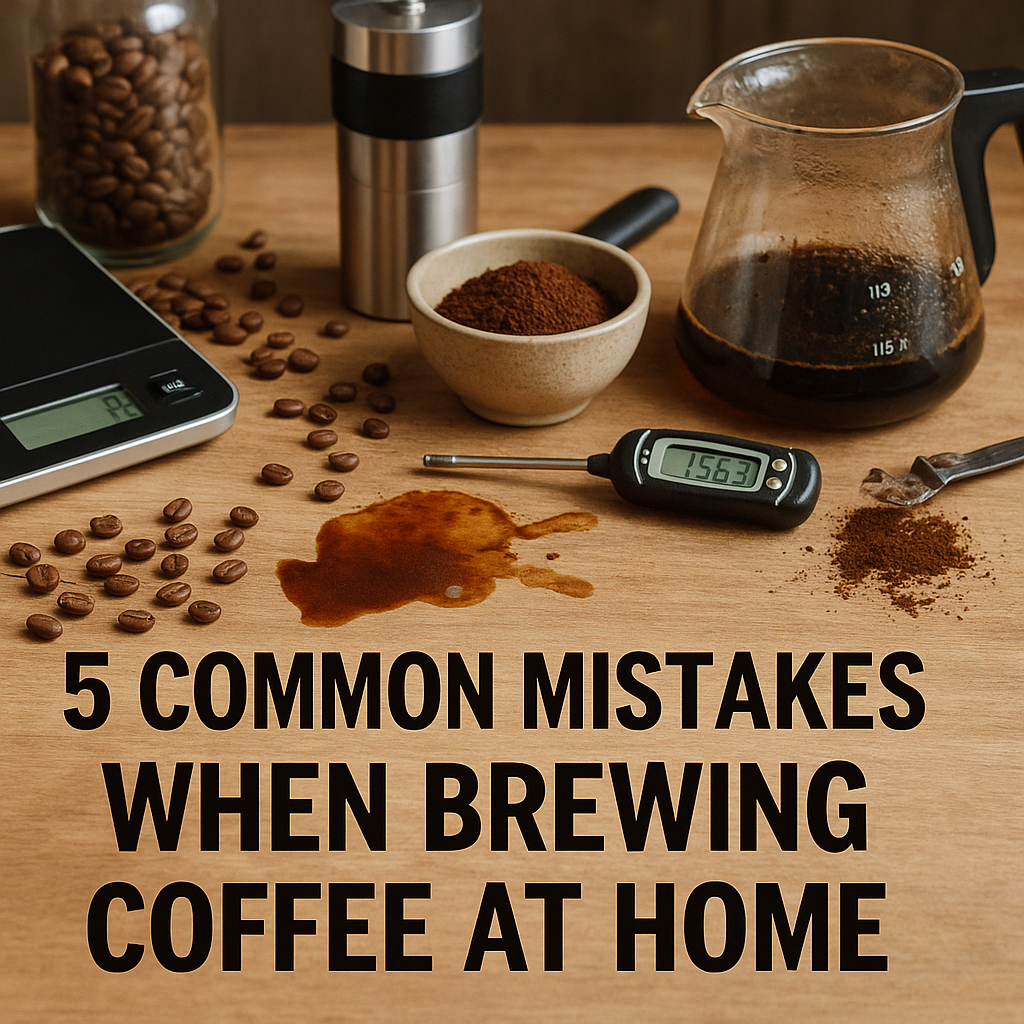Brewing coffee at home can be a comforting, rewarding experience — but it’s also surprisingly easy to get wrong. Even if you buy high-quality beans or the latest equipment, a few small missteps can dramatically affect the flavor of your cup. Whether you’re just getting into home brewing or you’ve been making coffee for years, understanding these common mistakes can help you take your coffee game to the next level.
In this article, we’ll go over five of the most frequent errors people make when preparing coffee at home and explain how to fix them for a better, more flavorful cup every time.
1. Using the Wrong Water-to-Coffee Ratio
One of the biggest mistakes home brewers make is not measuring their coffee and water properly. Too much coffee makes it overly bitter and intense, while too little leads to a weak, watery brew. Eye-balling your measurements leads to inconsistency, and inconsistency leads to disappointment.
Solution: Use a digital scale. The golden ratio is generally 1 gram of coffee per 15 to 18 grams of water, depending on taste. For example, for one 250ml cup of coffee, you should use around 15–17 grams of ground coffee. This precision makes a noticeable difference in flavor.
2. Grinding Beans Incorrectly (or Too Far in Advance)
The grind size of your coffee matters more than most people realize. Each brewing method requires a specific grind:
- Espresso: very fine
- Pour-over: medium-fine
- French press: coarse
- Cold brew: extra coarse
If the grind is too fine, you’ll over-extract the coffee and get a bitter taste. If it’s too coarse, your coffee will be under-extracted and taste sour or bland. Another common issue is grinding coffee too early, which causes it to lose flavor and aroma.
Solution: Grind your coffee fresh, just before brewing, and adjust the grind size to match your brew method.
3. Using Poor-Quality or Old Beans
Coffee is an agricultural product — and it goes stale. Many people continue to use beans that have been open for weeks or even months. Old coffee beans lose their natural oils, aroma, and flavor complexity. Storing them in transparent or loosely sealed containers only makes it worse.
Solution: Buy freshly roasted beans and check the roast date (not just the expiration date). Look for bags with a one-way valve that allows gases to escape without letting air in. Store them in an airtight, opaque container in a cool, dark place.
Bonus tip: Avoid pre-ground coffee unless absolutely necessary. Whole beans retain their freshness longer.
4. Using Water That’s Too Hot or Too Cold
Water temperature is often overlooked, but it’s critical to proper extraction. If your water is too hot (above 96°C or 205°F), it will over-extract and make the coffee bitter. If it’s too cold (below 85°C or 185°F), the coffee will be weak and sour.
Solution: Aim for water around 90–96°C (195–205°F). If you don’t have a thermometer, let your kettle boil and then wait 30 seconds before pouring. You’ll hit the ideal temperature zone.
Also, don’t use distilled or heavily filtered water — coffee needs minerals to develop flavor. Clean tap water or spring water often works best.
5. Not Cleaning Your Equipment Regularly
Even if you brew perfect coffee once, it won’t stay that way for long if your equipment is dirty. Old oils, mineral deposits, and coffee residue build up in machines, grinders, and carafes, subtly ruining your flavor over time.
Solution: Clean all brewing equipment at least once a week, and rinse thoroughly after each use. That includes:
- Coffee grinders
- French presses or pour-over cones
- Espresso machines and drip brewers
- Water reservoirs and filters
A simple mixture of hot water and mild soap (or a dedicated coffee cleaner) goes a long way. Clean equipment = clean flavor.
Final Thoughts: Small Fixes, Big Flavor
Mastering home coffee brewing isn’t about fancy machines or rare beans — it’s about getting the basics right. Measuring accurately, using fresh beans, grinding correctly, controlling water temperature, and keeping everything clean can drastically improve the quality of your cup.
Avoiding these five common mistakes puts you ahead of most home brewers and helps unlock the full potential of your coffee, one satisfying sip at a time.
